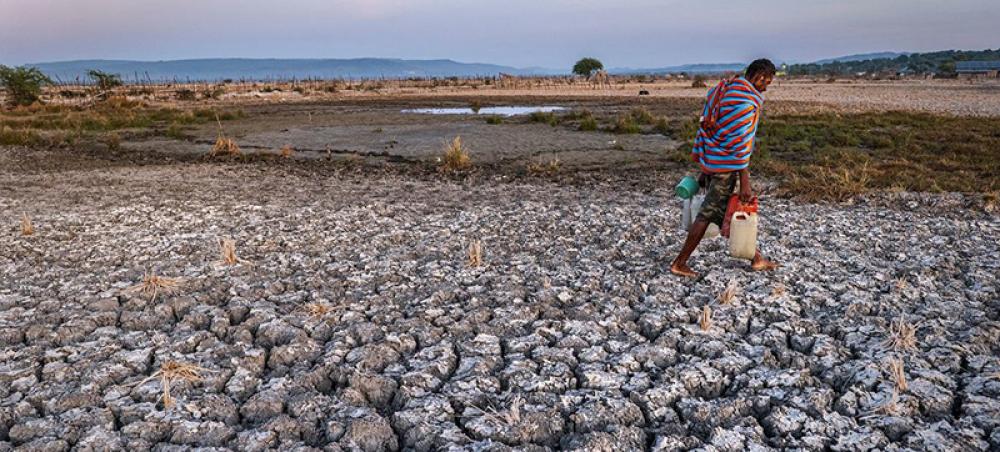Just Earth News | @justearthnews | 01 Dec 2023

The world is heating up at an unprecedented pace, new climate data shows, and leaders gathered for the COP28 conference which opened in Dubai on Thursday must get us out of “deep trouble”, UN chief António Guterres said.
While 2023 is not yet over, a provisional report from the UN World Meteorological Organization (WMO) confirmed that it is set to be the warmest on record, with global temperatures rising 1.4 degrees Celsius above pre-industrial levels.
Guterres said that the race is on to keep alive the 1.5-degree limit agreed by world leaders in Paris in 2015.
“We are living through climate collapse in real time – and the impact is devastating,” he warned in a video statement accompanying the launch of the report on the first day of this year’s annual UN climate talks.
Melting glaciers, rising seas
The UN Secretary-General recently visited two global warming hotspots, Antarctica and Nepal, where he bore witness to record low sea ice and was “shocked at the speed of receding glaciers”.
According to WMO’s report, the maximum Antarctic Sea ice extent for the year was a staggering one million square kilometres less than the previous record low, at the end of southern hemisphere winter.
Glaciers in western North America and the European Alps also experienced an “extreme melt season”.
Because of continued ocean warming and melting of glaciers and ice sheets, record sea level rise was also observed, WMO said.
Greenhouse gas levels keep climbing
Meanwhile, concentrations in the atmosphere of heat-trapping carbon dioxide, methane and nitrous oxide reached a record high last year and continued to increase in 2023.
WMO stressed that carbon dioxide levels are 50 per cent above the pre-industrial era and that the gas’s long lifetime “means that temperatures will continue to rise for many years to come”.
“These are more than just statistics,” said WMO chief Petteri Taalas, calling for action to “limit the risks of an increasingly inhospitable climate in this and the coming centuries”.
Dire consequences
From deadly Cyclone Daniel in Libya in September to devastating floods in the Horn of Africa following five consecutive seasons of drought and severe smoke pollution from Canada’s forest blazes, WMO’s report highlights the grim effects of climate upheaval on lives, health and livelihoods.
Throughout the year, communities suffering from extreme weather around the world faced food insecurity and displacement.
“Record global heat should send shivers down the spines of world leaders,” Mr. Guterres said. “And it should trigger them to act”.
Follow the roadmap
The UN chief reiterated his call on countries to “triple renewables, double energy efficiency… and phase out fossil fuels”.
According to WMO, last year renewable energy capacity grew by some 10 per cent worldwide, led by solar and wind power.
Guterres pointed to the existing roadmap to limit global temperature rise to 1.5 degrees Celsius. Eight years on, he urged governments to set “clear expectations” for the next round of climate action plans and invest in their implementation.
Protect people
The COP 28 conference will see the first-ever “global stocktake” to assess collective progress on cutting emissions and ramping up adaptation efforts and support to developing countries hard hit by a warming climate.
The UN Secretary-General said that countries must “go further and faster in protecting people from climate chaos”.
This includes ensuring that every person on Earth is covered by early warnings against extreme weather by 2027 and operationalizing a “loss and damage fund” to assist vulnerable hit hard by floods, droughts and other climate disasters with “generous, early contributions” from richer nations, he said.
Developed countries must honour the promise to deliver $100 billion per year in climate finance, which was first made at COP15 in 2009, and double the amount of funding going towards adaptation efforts, he insisted.
COP28
The UN climate conference taking place from 30 November to 12 December in Dubai is the 28th Conference of Parties to the UN Framework Convention on Climate Change (UNFCCC), which entered into force in 1994.
Over 60,000 delegates are expected to attend, including the member states of the UNFCCC, industry leaders, youth activists and representatives of indigenous communities.
All eyes will be on the conclusions of the first global stocktake – referred to as a ‘temperature check’ on where the world stands in meeting commitments under the Paris Agreement – and countries’ willingness to use them as a springboard towards more ambitious, accelerated climate action.